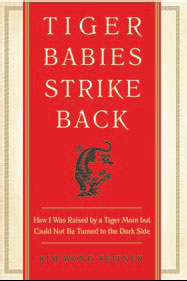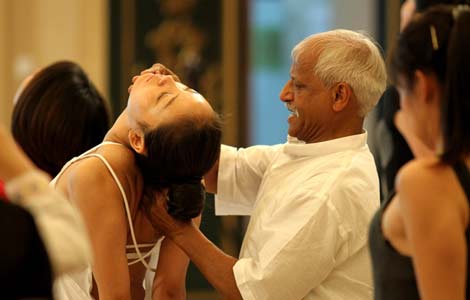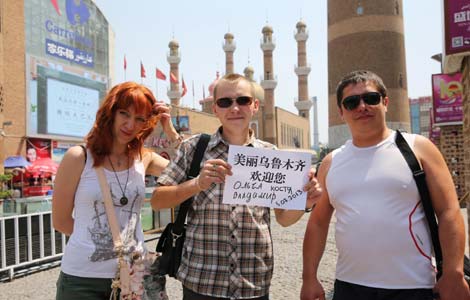Author takes on Tiger Mother
Updated: 2013-06-14 13:23
By Kelly Chung Dawson in New York (China Daily)
|
||||||||

When Princeton professor and author Amy Chua published Battle Hymn of the Tiger Mother in 2011, the resulting media melee seemed to tap into a simmering vat of insecurities about the economic rise of China. An excerpt published in the Wall Street Journal under the headline "Why Chinese Mothers Are Superior" triggered a heated debate about the pros and cons of a discipline style that discourages improvisation and creativity in favor of repetition and diligence. Was the US doing its children a disservice by not taking cues from the Chinese education system?
Novelist Kim Wong Keltner's new book, Tiger Babies Strike Back: How I Was Raised by a Tiger Mom but Could Not Be Turned to the Dark Side, responds with a resounding No, as an impassioned ode to "all the lonely, lost kids who aren't going to get into Harvard or Berkeley," Keltner said.
"Many Asians in the US are facing an identity crisis today, because we've been pigeonholed into stereotypes of success," she said. "Not enough of us are saying, I choose not to fit into this one box that my parents and the world have defined for me. Amy Chua's kids obviously turned out great, but it's only when kids turn out great that we can laugh about it.
"There's this entire group of kids out there who feel lonely and anxious because they're not necessarily going to be successful in that same way, and I want my book to be a message in a bottle to those kids," Keltner added.
In descriptions of her strained relationship with her own "Tiger Mother," Keltner likens the relief of a post-visit return home to the feeling of having gnawed off her own paw to escape the metal teeth of a spring-loaded trap. "How many emotional body slams can we take before ending up with permanent brain damage?" she asks.
Her own parenting approach today is a rebellion against what she sees as a cold pragmatism that robs children of their voices, an argument echoed recently in a study by University of Texas-Austin psychology professor Su Yeong Kim. Titled "Does 'Tiger Parenting' exist? Parenting profiles of Chinese Americans and adolescent developmental outcomes," Kim's study demonstrated that children raised in Tiger Mother-style households have higher rates of depression, and lower grades. Naturally, the report set off another wave of media coverage linked to Chua's book. Although the media has been quick to pit Chua against both Keltner and Kim, Chua, in an interview with the Wall Street Journal, denied there was any tension between them.
"People keep trying to pit me against Kim Wong Keltner, or to ask me to comment on that parenting study, and I keep telling them 'Look, all I did was write my personal family story'," Chua said. "I read her excerpt and Keltner strikes me as a really funny person, with a poignant and important perspective. And anyone who actually reads my whole book would understand that what she has to say is completely consistent with where I ended up What I said was that when this kind of parenting succeeds it succeeds, but when it doesn't, it really doesn't."
While the marketing for Battle Hymn of the Tiger Mother seemed to target Western audiences, Tiger Babies Strike Back will likely resonate most with Asian American readers. Keltner's warm, frank voice intercuts humor with emotional weight, and the lives she describes will surely ring true to the children of immigrant parents.
kdawson@chinadailyusa.com
(China Daily USA 06/14/2013 page11)

 Breathe deep, this is the real thing
Breathe deep, this is the real thing
 Families of crash victims in SF
Families of crash victims in SF
 Rainstorms cause severe flooding and landslides
Rainstorms cause severe flooding and landslides
 Coal burning in China's north can shorten lives
Coal burning in China's north can shorten lives
 Some solar companies see brighter first half
Some solar companies see brighter first half
 Thousands flock to Texas Capitol over abortion
Thousands flock to Texas Capitol over abortion
 China's youngest city glistens under palm trees
China's youngest city glistens under palm trees
 Xinjiang tourism recovering
Xinjiang tourism recovering
Most Viewed
Editor's Picks

|

|

|

|

|

|
Today's Top News
China, US hold cyberissues talks
Shenzhen Red Cross denies organ claim
Security in cyberspace 'still major problem'
Headwinds may buffet growth
Rainstorms cause severe flooding and landslides
Li reassures sugarcane farmers
Japan tags China as 'security threat'
Honesty is a challenge for CPC
US Weekly

|

|







